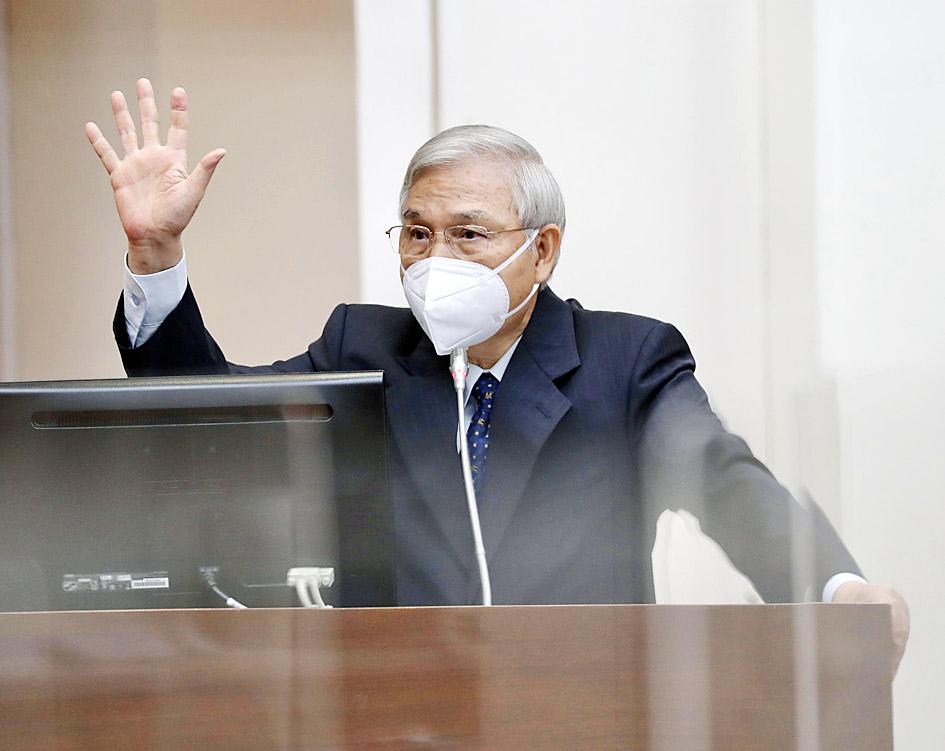Taiwan’s central bank is likely to raise interest rates by 0.125 percentage points on June 16 as it struggles to curb inflation without hurting an economy that is facing increasing headwinds, a Taipei-based economist said.
Taiwan’s consumer price index, hovering above 3 percent for the past two months, is not as serious as the 8 percent seen in the US and the EU, meriting a measured and moderate approach, said Chang Chuang-chang (張傳章), president of the Chunghua Institution for Economic Research (CIER, 中華經濟研究院).
Several central bank board members shared the same opinion during the bank’s March meeting, but decided on an interest rate hike of 0.25 percentage points.

Photo: CNA
Chang said that the central bank is now in a difficult position as it also must tackle growing economic downside risks induced by China’s COVID-19 restrictions and spikes in energy and raw material prices.
Manufacturers across all sectors are pessimistic about business prospects in coming six months, given the latest manufacturing purchasing managers’ report, while COVID-19 infections locally are diminishing business in finance, retail, restaurants, hotels and transportation, Chang said.
The backdrop renders a slight rate hike of 0.125 percentage points a wise option to curb inflation and slow capital flight, he said.
Global funds have swiftly left emerging markets this year to purse better yields in the US, where the US Federal Reserve has made clear it would raise interest rates by 0.5 percentage points in upcoming policy meetings.
Rate hikes are not the only policy tool in battling inflation, and Taiwan’s central bank does not need to follow the Fed’s lead, Chang said.
The Directorate-General of Budget, Accounting and Statistics last month trimmed its forecast for the nation’s GDP growth this year from 4.42 percent to 3.91 percent, reflecting unfavorable economic uncertainty, he said, adding that steep rate hikes would add financial burdens to an average family.
More than 70 percent of Taiwanese families have mortgage obligations, and interest rate hikes would increase their monthly payments, CIER vice president Wang Jiann-chyuan (王健全) said.
Interest rates for mortgage payments could rise to 2 percent next year, creating significant pressure on the housing market if the central bank hikes interest rates for the rest of this year, Wang said.
The central bank is adopting a hawkish policy stance to narrow the interest-rate gap between Taiwan and the US, which is causing ongoing capital flight, Wang said.

The US dollar was trading at NT$29.7 at 10am today on the Taipei Foreign Exchange, as the New Taiwan dollar gained NT$1.364 from the previous close last week. The NT dollar continued to rise today, after surging 3.07 percent on Friday. After opening at NT$30.91, the NT dollar gained more than NT$1 in just 15 minutes, briefly passing the NT$30 mark. Before the US Department of the Treasury's semi-annual currency report came out, expectations that the NT dollar would keep rising were already building. The NT dollar on Friday closed at NT$31.064, up by NT$0.953 — a 3.07 percent single-day gain. Today,

‘SHORT TERM’: The local currency would likely remain strong in the near term, driven by anticipated US trade pressure, capital inflows and expectations of a US Fed rate cut The US dollar is expected to fall below NT$30 in the near term, as traders anticipate increased pressure from Washington for Taiwan to allow the New Taiwan dollar to appreciate, Cathay United Bank (國泰世華銀行) chief economist Lin Chi-chao (林啟超) said. Following a sharp drop in the greenback against the NT dollar on Friday, Lin told the Central News Agency that the local currency is likely to remain strong in the short term, driven in part by market psychology surrounding anticipated US policy pressure. On Friday, the US dollar fell NT$0.953, or 3.07 percent, closing at NT$31.064 — its lowest level since Jan.

The New Taiwan dollar and Taiwanese stocks surged on signs that trade tensions between the world’s top two economies might start easing and as US tech earnings boosted the outlook of the nation’s semiconductor exports. The NT dollar strengthened as much as 3.8 percent versus the US dollar to 30.815, the biggest intraday gain since January 2011, closing at NT$31.064. The benchmark TAIEX jumped 2.73 percent to outperform the region’s equity gauges. Outlook for global trade improved after China said it is assessing possible trade talks with the US, providing a boost for the nation’s currency and shares. As the NT dollar

The Financial Supervisory Commission (FSC) yesterday met with some of the nation’s largest insurance companies as a skyrocketing New Taiwan dollar piles pressure on their hundreds of billions of dollars in US bond investments. The commission has asked some life insurance firms, among the biggest Asian holders of US debt, to discuss how the rapidly strengthening NT dollar has impacted their operations, people familiar with the matter said. The meeting took place as the NT dollar jumped as much as 5 percent yesterday, its biggest intraday gain in more than three decades. The local currency surged as exporters rushed to